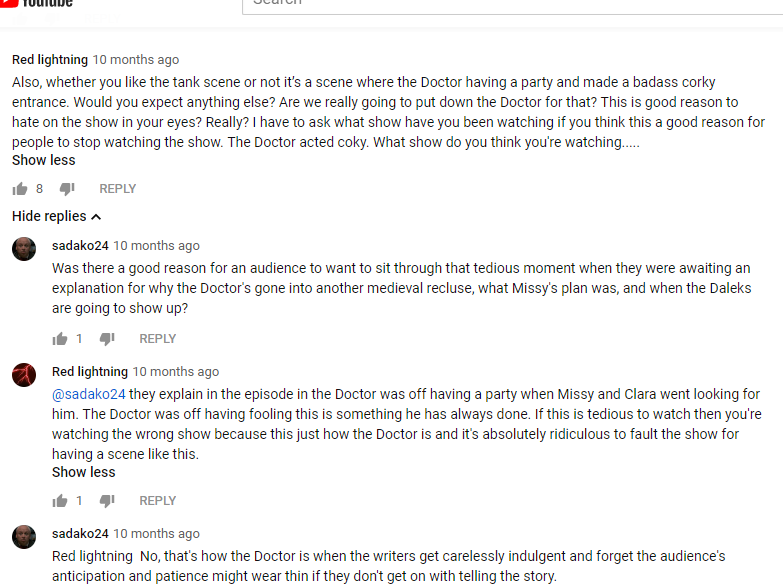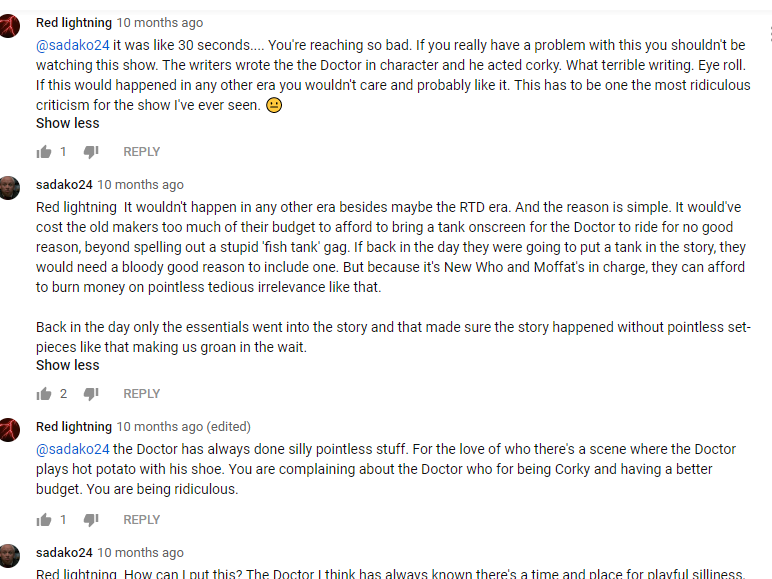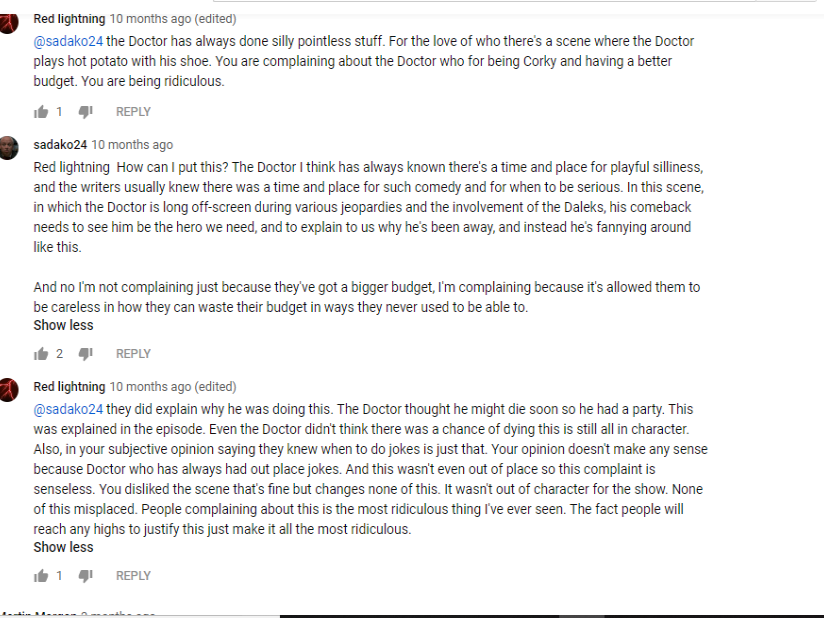So many people go on about how you can't question RTD's formula because it was a success, "A BRILLIANT, BRILLIANT SUCCEEEEEEEESSSSS". Even if you don't like it, you have to accept that was the best way to bring DW back.
Well personally I'm going to say that overall no it wasn't. It WAS successful at first, but in the long run New Who has actually been a disaster.
The RTD era was hugely popular for two reasons.
1/ Nostalgia: RTD and the rest of the Fitzroy try and paint it as DW was a dead brand in the 90s until they came along. Not true at all. DW had been hugely popular on video and DVD, and in 2002 the show was voted in a nationwide poll the series people would most like to see return (above Blackadder!)
Its worth noting as well that until Voyage of the Damned, Rose was the highest rated episode of the revival. Even today its among the top 5 of the RTD era.
2/ It cashed in on the then popular young adult, fantasy romance genre. Buffy and Angel, Xena and Gabrielle had come and gone by then, and Twilight was just around the corner. New Who that fell slap in the middle benefited from that craze, but in the long run it wasn't a good formula.
It pigeon holed the Doctor into too strict a role. Whilst its true that the original Doctor had a template to his character, it was one that you could fit into different situations, spy espionage, base under siege, horror etc. The New Who Doctor however to modern audiences became strictly a young, romantic, relatable figure.
If they tried to make him anything else as seen with both Matt and Capaldi in their first years then it would be too jarring for new viewers, hence why they both ended up as Tennant clones lusting after Jenna in their second year.
As a result of this and the shows lack of continuity, its viewers fell every year between Tennant's last and Jodie's first.
As much as I love Matt if you look you can see that viewers fall during his three seasons, to pretty low overnights until they are given a brief boost for the 50th. They then continue to crash every year to barely above 2 million for Capaldi's last series.
Whilst Jodie gave them a brief spurt for her first few episodes out of the novelty and hype, they ultimately sunk yet again to record lows in some cases like Resolution.
When you look at Classic Who its the reverse, its viewers between season 6 and 12 go up every year. This is before we get into all the hiatus (which classic who only had once in the C Baker era.) And the fact that it's reputation is now worse than it ever was before.
IMO New Who won't last another 2 years. So with this in mind New Who will be lucky to last half as long as Classic Who. Its gone through 6 Doctors (7 if you include Handy) and changed the characters sex too, yet it barely managed to scrape enough interest for 12 seasons. Classic Who was about to peak aftet that time!
Also in the UK Classic Who outsells New Who on DVD every year too, by a considerable amount. Abroad meanwhile Tom Baker still remains the most iconic Doctor.
This just goes to show why the Classic era formula is the best. I think had they brought it back that way, with improved effects of course in the 00s, whilst it might not have been the sensation Tennant was for 2 or 3 years, it would have been in a much better place and more sure of itself for the next ten years, with a more stable fanbase.
Well personally I'm going to say that overall no it wasn't. It WAS successful at first, but in the long run New Who has actually been a disaster.
The RTD era was hugely popular for two reasons.
1/ Nostalgia: RTD and the rest of the Fitzroy try and paint it as DW was a dead brand in the 90s until they came along. Not true at all. DW had been hugely popular on video and DVD, and in 2002 the show was voted in a nationwide poll the series people would most like to see return (above Blackadder!)
Its worth noting as well that until Voyage of the Damned, Rose was the highest rated episode of the revival. Even today its among the top 5 of the RTD era.
2/ It cashed in on the then popular young adult, fantasy romance genre. Buffy and Angel, Xena and Gabrielle had come and gone by then, and Twilight was just around the corner. New Who that fell slap in the middle benefited from that craze, but in the long run it wasn't a good formula.
It pigeon holed the Doctor into too strict a role. Whilst its true that the original Doctor had a template to his character, it was one that you could fit into different situations, spy espionage, base under siege, horror etc. The New Who Doctor however to modern audiences became strictly a young, romantic, relatable figure.
If they tried to make him anything else as seen with both Matt and Capaldi in their first years then it would be too jarring for new viewers, hence why they both ended up as Tennant clones lusting after Jenna in their second year.
As a result of this and the shows lack of continuity, its viewers fell every year between Tennant's last and Jodie's first.
As much as I love Matt if you look you can see that viewers fall during his three seasons, to pretty low overnights until they are given a brief boost for the 50th. They then continue to crash every year to barely above 2 million for Capaldi's last series.
Whilst Jodie gave them a brief spurt for her first few episodes out of the novelty and hype, they ultimately sunk yet again to record lows in some cases like Resolution.
When you look at Classic Who its the reverse, its viewers between season 6 and 12 go up every year. This is before we get into all the hiatus (which classic who only had once in the C Baker era.) And the fact that it's reputation is now worse than it ever was before.
IMO New Who won't last another 2 years. So with this in mind New Who will be lucky to last half as long as Classic Who. Its gone through 6 Doctors (7 if you include Handy) and changed the characters sex too, yet it barely managed to scrape enough interest for 12 seasons. Classic Who was about to peak aftet that time!
Also in the UK Classic Who outsells New Who on DVD every year too, by a considerable amount. Abroad meanwhile Tom Baker still remains the most iconic Doctor.
This just goes to show why the Classic era formula is the best. I think had they brought it back that way, with improved effects of course in the 00s, whilst it might not have been the sensation Tennant was for 2 or 3 years, it would have been in a much better place and more sure of itself for the next ten years, with a more stable fanbase.

 Home
Home





